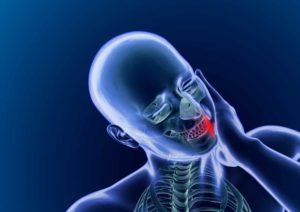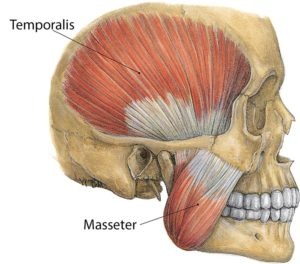
Chronic jaw pain or pain when chewing are serious chronic problems for millions of patients. There are many causes that are not related to tooth problems. Unlike toothaches, the cause of facial pain isn’t always easy to diagnose.
A thorough examination will reveal the exact cause of your condition. It is often caused by issues with your temporomandibular joint (or “TMJ”). TMJ pain is often caused by problems other than the joints. Your doctor can help you find a custom designed treatment plan to find permanent relief.
What causes chronic jaw pain?
Chronic facial pain when chewing can be caused by a number of issues. An injury to the chin, mandible, or TMJ itself can stretch or tear the ligaments supporting the joint. Other causes or risk factors are:
- missing back teeth
- malocclusion or poor alignment of the jawbones or of the wisdom teeth
- bruxism
- gnashing teeth
- heart attack
- cluster headaches
- trigeminal neuralgia
- arthritis
- injuries to face or mouth
- stressful situations
- gum disease or poor dental treatment that does not respect how the teeth come together.
Another cause of jaw and facial soreness could be an infected or abscessed tooth. When infection develops deep within a tooth root, dull, aching or throbbing may be felt below the gum’s surface and radiate outwards to the rest of the jaw. Other times, infected or abscessed teeth may produce sharp pains. An examination and X-rays can narrow down the source of your face discomfort. Other medical causes of headaches must be screened for. If no dental cause is found, then medical advice is requested.
Joint pain when chewing
A common source of chronic jaw pain is in one or both of your temporomandibular joints. These joints are where your lower jaw connects to your skull, and where they open, close, and move as needed. While they’re typically highly resilient, TMJs can often become damaged or inflamed due to excessive pressure or injury. When pain in the joints occurs, you may find it it difficult to bite and chew comfortably.
What are the symptoms of temporomandibular joint disorder?
Most patients with temporomandibular disorders are between the ages of 20 and 40, and many estimates show somewhere between 10 to 35 million Americans may suffer from chronic TMJ pain symptoms. Could you be one of the millions suffering from TMD? Symptoms include:
- Tender cheeks, jaw, forehead, and temples. Often symptoms may worsen when pressure is directly applied to the area or when biting or chewing.
- Frequent tension type headaches or migraines that may be worse in the morning
- Sore, tired, or stiff neck muscles in the neck and shoulders
- Signs of bruxism (teeth grinding and clenching)
- Chronic soreness in the jaw area that might differ from day to day
- Jaw muscle pain when chewing
- Ringing in the ears
- Anxiety
- Facial muscle fatigue or a feeling of “tiredness” in the face or jaw
- Soreness with mandibular movement
Signs and symptoms of bruxism include:
- Worn or flattened teeth
- Migraines or headaches that are worse in the morning
- Muscle spasms, fatigue, or stiffness in the jaw and face
- Teeth sensitivity
- Limited jaw movement with difficult to fully open or close your mouth
- Jaw joint locking, popping, or clicking when you open your mouth
What can I do about chronic jaw and facial pain?
If you have jaw pain when chewing, then you may find temporary relief with remedies like an ice pack, an over the counter pain reliever, or a gentle massage to your TMJs. However, if you have TMJ disorder, then the only way to actually relieve it is to have your dentist diagnose and treat it professionally. A thorough examination will help your dentist pinpoint the exact nature of your disorder, and then design that most appropriate way to correct it.
Tooth grinding and clenching during sleep may be greatly contributing to facial pain. This unconscious grinding is usually brought on by stress or anxiety during the day. It is much more powerful while sleeping.
I have chronic jaw pain when chewing
Many patients have pain when they chew. There are two common origins of chewing difficulties. The pain is either coming from the muscles or the joints.

Lactic acid buildup in chewing muscles from grinding is often responsible for jaw pain
Myofascial Pain Syndrome from Muscle Soreness
The muscles could just be sore from overwork. When a patient grinds or clenches all night, lactic acid builds up in the muscles. Just as an athlete gets sore when doing a new workout, the chewing muscles can overdo it also. Your dentist can offer advice on how to rest the muscles. Anecdotal evidence exists that chewing gum soothes the muscles by dissipating the lactic acids buildup.
TMJ pain
People are surprised to learn that the jaw joints are more complex than all other of our joints. They hinge like all others, but they also slide down and forward. There is a special disc that helps the mandible to slide forward. This disc can get caught or stuck in the slide path of the mandible. If this occurs, discomfort is felt in the joint and the patient can’t fully open.
Night Guards help manage the tension headaches
Tension head pain or TMJ headaches are caused by overworking muscles of the mandible. Many are surprised that there are muscles on the top of the head that close the jaw. To lessen the work the muscles do while grinding, a mouth guard or other oral appliance can be made. Dr. Fondriest can specially fit you for a custom night guard or protective device to prevent your teeth from coming together during the night.
Night guards reduce the amount of force exerted on the teeth, jawbone, and joints from tooth grinding or clenching. The TMJ and connected structures can experience less stress and pressure along with reduced muscle inflammation. Exercising relaxation techniques and using a night guard is much preferred to using a muscle relaxer.
It is this muscle inflammation that causes tension headaches. Wearing a night guard limits how hard the muscles work. Less work means less lactic acid buildup and fewer headaches. For many patients, this helps to reduce chronic facial pain symptoms.
Sometimes dentistry is needed to fix the bite
For other patients, more extensive treatments such as bruxism veneers may be needed to treat underlying causes of pain in the mouth and jaw. Dr. Fondriest has years of experience helping patients find relief from facial pain, and can help to find the source of your discomfort.
Ask your dentist about what causes your chronic pain in the jaw when chewing
When your jawbone hurts consistently, the best way to treat it may be to address your underlying TMJ disorder.
Dr. Fondriest has had extensive training in treating TMJ pain at the world renowned L. D. Pankey Institute. He is currently active as a senior faculty member there. The Pankey Institute specializes in the study of occlusion (bite) and treatment TMJ disorders. It is considered by many to be the world’s leader in research and treatment of TMJ disorders.
To learn more or to schedule a consultation with the Chicago area’s leading oral health and TMJ expert, call us at 847-234-0517. We serve residents of the greater Chicago area.
